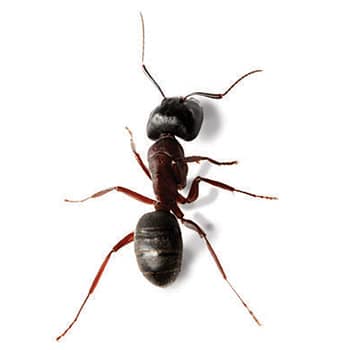Pennsylvania Ant Control

Ants are some of the most common and easily identified household pests in Pennsylvania. While ants seldom pose a health risk to humans, they can destroy property by infesting food supplies, creating cross-contamination, and even chewing holes in wood, paper, or cardboard. To top it off, ant infestations in Pennsylvania are inconvenient and unsightly for your home or business.
To protect your Pennsylvania home or business from ants, you need to learn about the behavior of this pest, take steps for prevention, and find effective treatment options should an infestation occur.
How Can I Identify Common Pennsylvania Ant Species?
There are four species of ants that frequently enter homes and businesses in Pennsylvania. Here’s how you can recognize them explained by Viking Pest’s certified entomologist, Craig:
- Carpenter ants: These large black ants are some of the most common culprits of home invasions. While they usually live and nest outdoors in colonies, worker ants may wander into homes in search of food. Carpenter ants are named such because they excavate wood, although they’ll seldom damage dry, treated wood, preferring to nest in moist, rotted logs and stumps. The most commonly-seen carpenter ants are worker ants, which range in size from 6–12 mm. They are usually dark brown or black in color, with a glossy sheen.
- Citronella ants: You may recognize the term “citronella” from the scent of bug-repellent candles. Citronella ants get their name from the lemony odor that they emit when threatened. These large yellow ants are fairly common in Pennsylvania homes. Worker citronella ants are 4 to 4.5 mm long. Swarmers, on the other hand, are about 8 mm long, with grey wings. Because of their light coloring and tendency to fly and swarm, they can often be confused with termites. However, unlike termites and other pest ant species, citronella ants don’t nest in homes.
- Pavement ants: Pavement ants are some of the most common home-invading ants that can be found in Pennsylvania. Much like carpenter ants, pavement ants are dark brown or black in color. However, pavement ants are significantly smaller, ranging from 2.5–4 mm in length. Pavement ants nest under the ground and often emerge through cracks in soil, pavement, and rocks in order to forage for food. Pavement ants consume sugar, grease, seeds, and dead insects, and frequently scavenge kitchens to feed their colonies.
- Thief ants: Thief ants are native to Pennsylvania and commonly infest homes and businesses in the area. However, these tiny creatures often go unnoticed. 1.5 mm in length and yellowish or tan in color, thief ants get their name from their tendency to nest close to other ant colonies in order to steal resources. They prefer protein food sources, including grease and meat, and have large colonies consisting of multiple queens and thousands of workers.
What Season Are Ants Most Commonly Found in Pennsylvania Homes and Businesses?
The Pennsylvania pest control experts at Viking Pest explain the most common season for ant infestations is in the springtime. Much like other insect species in Pennsylvania, ants hibernate underground during the winter. In the springtime, worker ants venture forth to find food sources to nourish newly-hatched larvae. If these scouts locate a ready food source in your home, they leave a scent trail leading the rest of the colony to the food source so they can scavenge and store food in the nest.
Ants may also become a pest problem in Pennsylvania homes and businesses when they swarm. For most species in the state, this occurs most commonly in mid-to-late summer, after the mating season when reproducing organisms search for a new home for their future colony. However, swarms can happen year-round and are also frequently seen in fall or even spring, explain the Pennsylvania exterminators at Viking Pest.
How to Prevent Ants in Pennsylvania
The best way to control ant infestations in Pennsylvania is to establish prevention measures that restrict their access to potential food sources. Maintaining a tidy kitchen and pantry goes a long way. Additionally, individuals should be vigilant in noticing scouting ants and cleaning any scent trails they might leave with soap and water.
You may also watch for ants by keeping an eye out for signs of satellite nests in or near the house. Pennsylvania pest control experts at Viking Pest explain you can spot carpenter ant nests by searching for piles of stringy wood shavings and similar debris that comes from siding, cracks in the wall, baseboards, etc. Pavement ants, on the other hand, can often be spotted by the small piles of sand and dirt they leave around their tunnels outdoors.
Additional Helpful Resources
Viking Pest Control Can Help Control Pest Ants in Pennsylvania
Viking Pest offers expert treatment designed to effectively and efficiently control and prevent ants from invading your home or business in Pennsylvania. Our use of Integrated Pest Management (IPM) techniques focuses on finding the core of the pest concern and controlling ants from the source. Through IPM, pest control materials are selected and applied in a manner that minimizes risks to human health, pets, and the environment. Call Viking today for your FREE and NO OBLIGATION estimate at 1-800-618-2847 or schedule online today!














